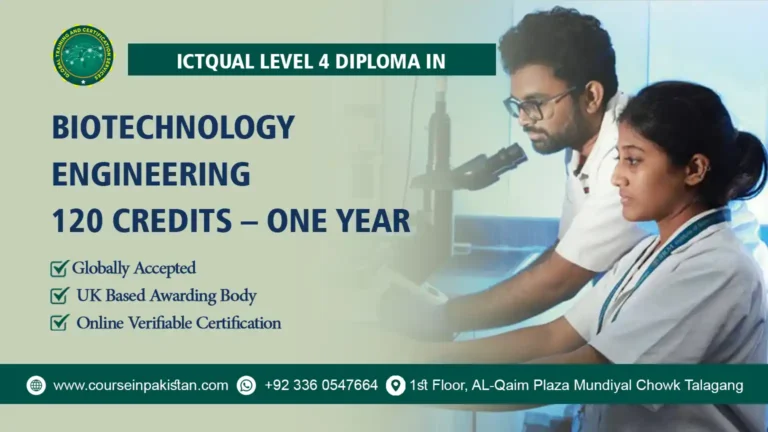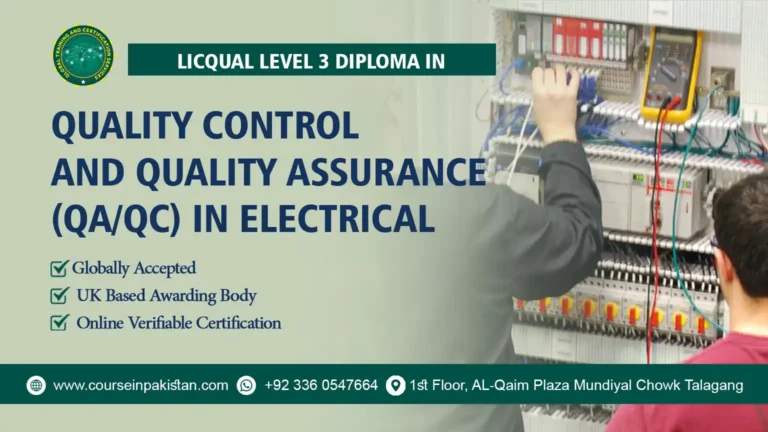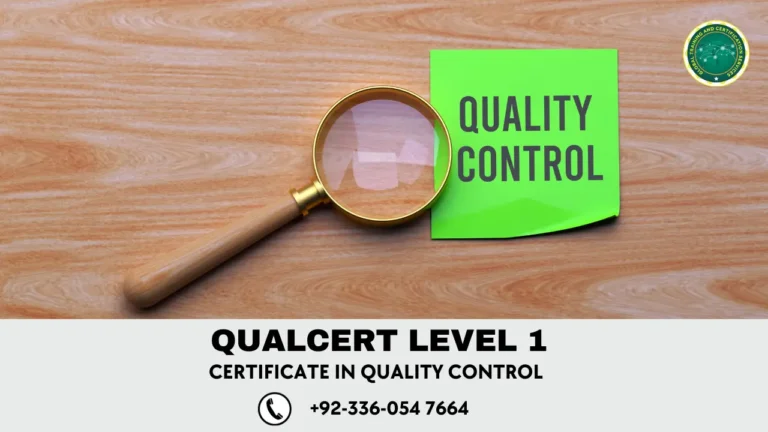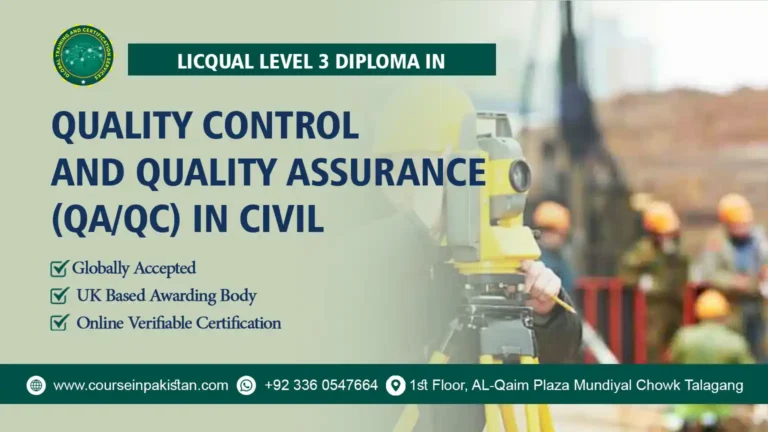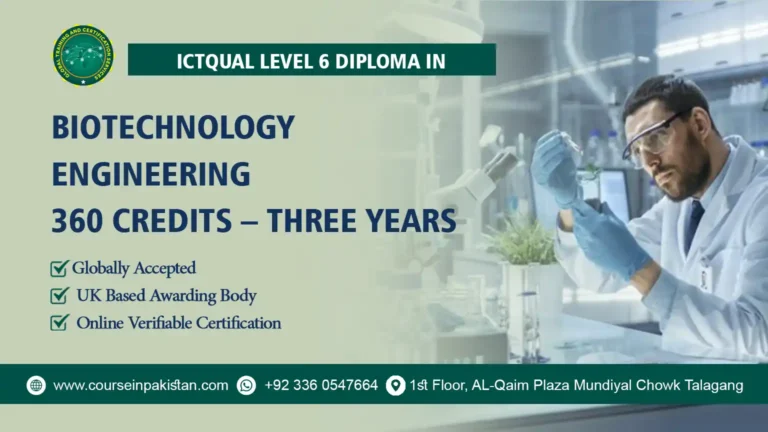
Level 7 Diploma in Quality Control (QC)
In the realm of quality management, achieving excellence is not just a goal but a continuous journey of improvement and innovation. The Level 7 Diploma in Quality Control (QC) is the pinnacle qualification for professionals aiming to become leaders in the field of quality management. This advanced diploma program delves deep into complex quality control methodologies, strategic leadership, and advanced analytical techniques, preparing participants to drive transformative change and uphold unparalleled quality standards within their organizations.
The Level 7 Diploma in QC represents the highest level of qualification in quality control, offering participants an opportunity to expand their knowledge, refine their skills, and master the intricacies of quality management in today’s competitive global landscape. This program is designed to equip experienced professionals with the expertise needed to lead quality initiatives, drive organizational excellence, and navigate complex quality challenges.
Course Overview :
This diploma program encompasses a comprehensive range of advanced topics in quality control:
- Advanced Quality Control Concepts: Explore sophisticated theories and principles underpinning quality management to achieve operational excellence.
- Strategic Quality Leadership: Develop leadership skills essential for guiding quality teams, fostering innovation, and driving change within organizations.
- Advanced Analytical Techniques: Utilize advanced statistical analysis, experimental design, and data-driven decision-making to optimize quality control processes.
- Industry-Specific Quality Standards: Interpret and apply sector-specific quality standards and regulatory requirements to ensure compliance and superior quality outcomes.
- Advanced Problem-Solving and Decision-Making: Apply advanced problem-solving methodologies and critical thinking skills to address complex quality issues effectively.
- Quality Management Systems (QMS): Design, implement, and manage robust QMS aligned with organizational objectives and international standards.
- Advanced Quality Inspection and Testing: Master precision measurement and inspection techniques to validate product/service quality and reliability.
- Ethics and Governance in Quality Control: Uphold ethical standards and governance principles to ensure integrity, transparency, and accountability in quality practices.
Course Benefits
- Expertise and Mastery: Gain advanced knowledge and mastery of quality control principles, methodologies, and tools.
- Career Advancement: Enhance career prospects and open doors to senior leadership roles in quality management and strategic planning.
- Global Recognition: Earn a prestigious diploma that demonstrates expertise and credibility in quality control at an international level.
- Operational Excellence: Contribute to improved organizational performance, customer satisfaction, and competitive advantage through superior quality management.
- Leadership Development: Develop advanced leadership skills to inspire teams, drive continuous improvement, and lead organizational change initiatives.
Course Study Units
-
Strategic Quality Planning and Management
-
Advanced Quality Assurance Techniques
-
Regulatory Compliance and Risk Management
-
Leadership and Organizational Change
-
Innovation in Quality Control
-
Supplier Quality Management
-
Sustainability and Ethical Practices in Quality Control
-
Advanced Project Management for Quality
-
Practical Applications and Case Studies
Learning Outcomes
Upon successful completion of the Level 7 Diploma in Quality Control, students will demonstrate proficiency in the following advanced areas of quality management:
1. Strategic Quality Planning and Management
- Develop Strategic Quality Plans: Create comprehensive quality plans aligned with organizational goals and objectives.
- Implement Effective Quality Strategies: Utilize strategic frameworks to drive continuous improvement in quality management systems.
- Measure and Improve Quality Performance: Apply advanced metrics and performance indicators to assess and enhance quality outcomes.
2. Advanced Quality Assurance Techniques
- Apply Advanced Statistical Methods: Utilize sophisticated statistical tools to monitor and optimize process performance and product quality.
- Prepare for Six Sigma Black Belt Certification: Master Six Sigma methodologies to achieve significant process improvements and reduce defects.
- Design of Experiments (DOE): Employ DOE techniques to optimize processes and products for superior quality and efficiency.
3. Regulatory Compliance and Risk Management
- Navigate Global Regulatory Standards: Interpret and comply with complex global regulatory requirements relevant to quality control.
- Manage Quality-Related Risks: Implement robust risk assessment and management strategies to mitigate quality risks effectively.
- Conduct Effective Quality Audits: Plan, execute, and manage comprehensive quality audits to ensure compliance and continuous improvement.
4. Leadership and Organizational Change
- Lead Strategic Quality Initiatives: Develop leadership capabilities to champion quality improvement initiatives and foster a culture of excellence.
- Implement Change Management Strategies: Apply effective change management techniques to drive successful quality transformations within organizations.
- Promote a Quality-Centric Culture: Cultivate an organizational culture that prioritizes and sustains high standards of quality and continuous improvement.
5. Innovation in Quality Control
- Leverage Quality Innovation and Technology: Harness emerging technologies such as AI, IoT, and automation to innovate and optimize quality control processes.
- Drive Digital Transformation: Implement digital tools and technologies to enhance efficiency and effectiveness in quality management practices.
- Promote Continuous Improvement and Innovation: Foster innovation in quality processes and systems to achieve sustainable business growth and competitive advantage.
6. Supplier Quality Management
- Ensure Supplier Quality Assurance: Develop strategies to ensure suppliers meet and exceed quality standards and requirements consistently.
- Enhance Supplier Performance: Monitor and improve supplier performance to enhance overall product quality and reliability.
- Build Sustainable Supplier Relationships: Cultivate collaborative and sustainable relationships with suppliers to achieve excellence in quality management.
7. Sustainability and Ethical Practices in Quality Control
- Integrate Sustainable Quality Practices: Embed sustainability principles into quality management systems and practices to promote environmental stewardship.
- Promote Ethical Behavior: Uphold ethical standards and practices within the realm of quality control to foster trust and credibility.
- Implement CSR Initiatives: Align corporate social responsibility initiatives with quality management objectives to contribute positively to society and stakeholders.
8. Advanced Project Management for Quality
- Plan and Execute Quality Projects: Apply advanced project management techniques to plan, execute, and control quality-related projects effectively.
- Optimize Resource Management: Manage resources efficiently to achieve quality project objectives within constraints.
- Manage Quality Project Lifecycle: Navigate the entire lifecycle of quality projects from initiation through to closure and evaluation with proficiency.
9. Practical Applications and Case Studies
- Analyze Industry Case Studies: Evaluate and apply lessons learned from real-world case studies to solve complex quality control challenges.
- Apply Hands-on Projects: Utilize advanced quality control methodologies and techniques through practical, hands-on projects to achieve desired outcomes.
- Collaborate Effectively: Engage in collaborative learning experiences to address quality-related issues and present findings professionally and persuasively.
Who is This Course For?
The Level 7 Diploma in QC is designed for:
- Experienced quality control professionals aspiring to advance their careers in senior management and executive roles.
- Quality directors, consultants, and advisors seeking to enhance their expertise in strategic quality leadership and organizational excellence.
- Individuals passionate about driving transformative change and innovation through superior quality management practices.
Future Progression for This Course
Upon completing the Level 7 Diploma in QC, participants can pursue further career development through:
- Doctoral Studies: Advance research and contribute to the theoretical and practical advancements in quality management.
- Executive Leadership Programs: Enhance strategic leadership and management skills to lead organizations through complex challenges.
- Certifications: Pursue specialized certifications such as Certified Quality Manager (CQM) or Certified Six Sigma Master Black Belt (CSSMBB) to further validate expertise and credentials.
The Level 7 Diploma in Quality Control equips professionals with the highest level of skills and knowledge to lead quality management initiatives, drive organizational excellence, and ensure superior quality outcomes in today’s competitive business environment. Embrace this opportunity to elevate your career and make a lasting impact as a leader in quality control and assurance.

